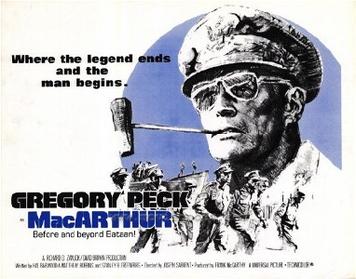In 1970, 20th Century-Fox had a huge hit with “Patton”. Naturally, other studios were determined to replicate the success. Universal made the logical decision to make a movie about another controversial WWII general, hoping to catch lightning in a bottle, too. John Sargent (The Hell With Heroes, Tribes) was tabbed to direct, but he was given a small budget. Most of the film would be shot on the back lot. He did get a big star in Gregory Peck (after John Wayne, George C. Scott, and Cary Grant turned down the role). Peck was all in and really got into character, including negotiating the buying of a house dressed as the general (he got a good deal). Peck enjoyed the role and although not a MacArthur fan before, he developed some empathy and respect for him as a result of the movie. Peck always bemoaned the poor script and low production values of the film. Although he was ignored by the Academy, he did get a Golden Globe nomination for his acting. The score was by “Patton” composer Jerry Goldsmith. The movie was not a box office success.
The movie signals its “Patton” vibe at the start by offering the question of whether MacArthur was a demagogue or a hero. The opening scene has the elderly general giving his “Duty, Honor, Country” speech at West Point. Starting with a speech, how original! It then flashes back to Corregidor in 1942. In his refuge in the tunnel, MacArthur is ordered by FDR to evacuate to Australia. The movie invents an unsuspenseful encounter with a mine to make the PT-boat ride more interesting, but it does not embellish his “feat” of escaping to Medal of Honor-worthy. MacArthur is upset with Wainwright’s surrender of his forces in the Philippines and ironically opposes the Medal of Honor for the hapless Wainwright. The rest of the movie is a trip through Mac’s greatest hits. He leap-frogs from New Guinea to the Philippines. He meets with FDR (Dan O’Herlihy)) at Pearl Harbor. He invades the Philippines. He oversees the surrender on the USS Missouri. He occupies Japan. Then the Korean War breaks out. Inchon is depicted with little combat. The dysfunctional relationship with Pres. Truman (Ed Flanders) includes their meeting on Wake Island. The movie concludes with his firing.
The obvious thing to do is to compare the movie to “Patton”. It begs you to do so. The screenwriters used its template. “MacArthur” even has a Steiger-like character in MacArthur’s press officer. (That’s right, he was a general with a PR specialist.) “Patton” was a tough standard to meet and the movie just did not have the budget to give it a go. Director Sargent did not have the resources to stage sweeping battle scenes. But people forget that “Patton” did not have much combat either. It’s the script that really separates the two. Peck was right to complain about it. It is quite talkative. Thankfully, the speeches have some verve because MacArthur was a good orator. The greatest hits format is instructive as the movie is accurate on the main events in MacArthur’s career. Historian J. Clayton James was the technical adviser. The plot contains no egregious historical errors. It is surprisingly balanced on the question of whether MacArthur was a demagogue or a hero. Although Peck portrays him as an ambitious prima donna, the film does not take on the question of whether he was a great general. His strategy is high school textbook correct, but there is nothing on the questionable decisions like dividing his army in Korea. On the other hand, it does a good job with the resulting conflict with Truman that came from that decision. The movie does make a case for his firing. However, fans and critics of the man will be disappointed. If you don’t have a dog in that fight, the movie is a good biography of a famous American.
Peck was certainly the right choice for the role (partly because he looks like MacArthur) and it is hard to imagine John Wayne in the role. He does not give a performance equal to Scott’s Patton, but he is the main draw for the film. The supporting cast is familiar B-movie actors with Flanders especially good as Truman. The cast is not given much to chew on. Another difference with “Patton”. It is curiously flat in tone. Part of this is due to the lack of action. Where we get some excellent behind the scenes coverage, the payoffs are a bit boring. For instance, the USS Missouri signing shows every country signing. That time could have been better spent at Inchon, but I guess the back lot at Universal didn’t suit that. The combat is bland and relies on actual footage blended with old school deaths. It is much less a war movie than “Patton”.
I took a while to watch this movie because I remember the bad press when it came out. I am not a MacArthur fan and consider him one of the most overrated American generals. His Medal of Honor is one of the most undeserved. I expected the movie to be either laudatory or a hit-job and was surprised to find it neither. It is basically a standard biopic. MacArthur certainly deserved one. He is a fascinating figure. Perhaps a miniseries would have done a better job in showing his polarizing career. As far as it’s duel with “Patton”, it is clearly inferior. If you have seen “Patton” and not “MacArthur”, you owe it to yourself to see how Hollywood tends to copy itself, but seldom tops itself.
GRADE = B-

No comments:
Post a Comment
Please fell free to comment. I would love to hear what you think and will respond.